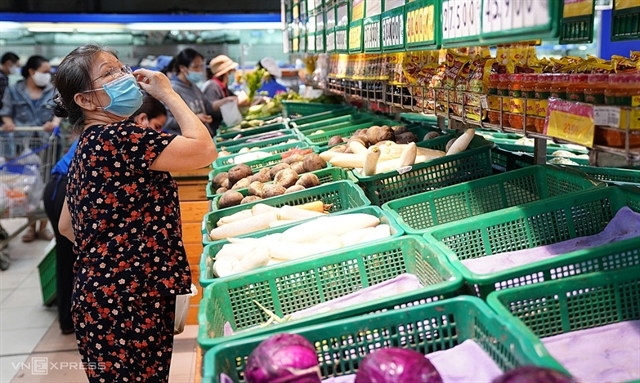
HÀ NỘI — While Vietnamese economists forecast higher economic growth and inflation for Việt Nam this year, IMF forecast the two at lower rates at a conference in Hà Nội on Monday.
Attending the national conference on the assessment of Việt Nam’s economy in 2021 and prospects for 2022, held by the National Economics University (NEU) and the Central Economic Commission, an expert from NEU said: “Keeping inflation below 4 per cent in 2022 is a difficult task.”
Tô Trung Thành, head of the Department of Scientific Management of NEU, said economic growth in 2021 declined sharply to 2.58 per cent, the lowest in the last two decades, from 2.91 per cent in 2020, as the first year during the pandemic.
Thành, who is also co-editor of the report named Vietnam Economic Review launched on the same day, said the severe recession in the third quarter of 2021 was due to the spread of the Delta variant while the vaccination rate was still low.
This year, he predicted the Vietnamese economic outlook may face some major challenges, including the new strain of Delta, escalating geopolitical instability and a sharp increase in oil prices, which threaten global recovery, affecting trade and investment in Việt Nam.
Rampant growth in the real estate and stock markets was another challenge for the economy when the credit capital flows have not yet entered the production sector but poured into the asset market, causing financial risks for the banking system with declining credit quality and increasing bad debts; increasing inflationary pressure.
Thành’s research team predicted that Việt Nam’s economic growth was likely to reach the target of 6.5 per cent in 2022, but the Government’s low inflation target of below 4 per cent was “unlikely to be achieved.”
The team said the main reason for high inflation came from increasing prices of basic commodities and gasoline, as well as the escalating war between Russia and Ukraine. The report said the high oil price movements in the first months of 2022 created additional challenges to the economy.
As of March 11, 2022, the average price of gasoline increased by 45.2 per cent compared to 2021, experts said it directly added 0.6 per cent to the consumer price index (CPI) and 2.34 per cent to the producer price index (PPI). In case the lower environmental tax was added to the prices of gas, the prices would increase by 41 per cent compared to the average in 2021, and CPI would be 0.5 per cent and PPI of 2.2 per cent higher.
The report said that the driving force for economic growth in 2022 still came from the production of processed and export products. While private sector investment could not recover quickly from the pandemic, the increased public investment will make a large contribution to the growth of 2022, said the report, adding policies that supported social security and employment would also help increase spending levels, contributing to the size of the economy.
Attending the conference, Francois Painchaud, Chief Representative of the International Monetary Fund (IMF), said lots of strict anti-pandemic measures were applied in China, as a large export market and an import market for intermediate materials for the production process for Việt Nam, which was a difficult factor for the local economy.
Francois Painchaud said geopolitical tensions between Russia and Ukraine had led to an increase in prices of goods, food, and raw materials, leading to higher inflation in many countries because of the sharp increase in commodity prices.
The IMF assessed that the consequences of price increases would likely last until 2023 with a higher rate than what was forecast for most of the economies, adding that in developed economies such as the US or Europe, inflation increased rapidly, at the highest level in the past 40 years.
He said that was why the IMF recently lowered the growth forecast of the world as well as many other countries, including Việt Nam, compared with the forecast in January 2022.
Painchaud appreciated the measures to support the recovery in Việt Nam, saying Việt Nam reopened with very high vaccine coverage and timely economic recovery policies, adding despite many difficulties, the country had had successes in stabilising the fiscal, external economy and financial market.
This year, IMF forecast Việt Nam’s economic growth to be 6 per cent and 7.2 per cent in 2023.
Regarding inflation, it forecast a lower inflation rate than in the NEU’s report. Painchaud said the inflation would reach 3.9 per cent, very close to the previously set control target of 4 per cent.
The IMF said in the short term, the local fiscal policy needed to be quick and flexible to support and coordinate with the transformation of the economy.
In NEU’s report, it said the Government’s policies needed to focus on how to develop the economy sustainably in the context of “living with the pandemic”.
At the same time, the report suggested policies needed to give special resources to the business sector, helping them recover and develop after the pandemic, especially those that have great spillover effects on the economy.— VnExpress News
- Reduce Hair Loss with PURA D’OR Gold Label Shampoo
- Castor Oil Has Made a “Huge” Difference With Hair and Brow Growth
- Excessive hair loss in men: Signs of illness that cannot be subjective
- Dịch Vụ SEO Website ở Los Angeles, CA: đưa trang web doanh nghiệp bạn lên top Google
- Nails Salon Sierra Madre
 VnExpress News The News Gateway of Vietnam
VnExpress News The News Gateway of Vietnam




